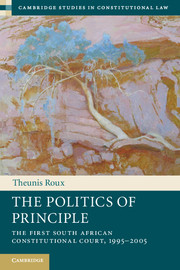Book contents
- Frontmatter
- Contents
- Acknowledgements
- Introduction
- Part I Problematic, Theory, Methodology
- 1 The Chaskalson Court's achievement
- 2 A conceptual framework for assessing the performance of constitutional courts
- 3 Operationalising the conceptual framework to explain the Court’s achievement
- Part II Context
- Part III Thematic Case Studies
- Conclusion
- Bibliography
- Index
- References
3 - Operationalising the conceptual framework to explain the Court’s achievement
Published online by Cambridge University Press: 05 April 2013
- Frontmatter
- Contents
- Acknowledgements
- Introduction
- Part I Problematic, Theory, Methodology
- 1 The Chaskalson Court's achievement
- 2 A conceptual framework for assessing the performance of constitutional courts
- 3 Operationalising the conceptual framework to explain the Court’s achievement
- Part II Context
- Part III Thematic Case Studies
- Conclusion
- Bibliography
- Index
- References
Summary
The conceptual framework developed in Chapter 2 invites assessment of the Chaskalson Court’s achievement in terms of its capacity to negotiate the legal and political constraints impacting on it. This assessment, it was suggested, is tantamount to tracking the Court’s movement across a two-dimensional matrix reflecting the relative strength of these constraints.
The usefulness of conceiving of the Court’s achievement in these terms is that it provides us with a shorthand way of expressing what it is that we need to explain, viz. that the Court found itself at the end of Chaskalson’s term as Chief Justice in the top half of the quadrant – working in a legal-professional culture strongly attached to the ideal of adjudication according to law and at the same time effectively able to assert its veto role. What we do not as yet know is whether the Court’s capacity to assert its role in this way was a consequence of its fortuitous location in the top left-hand sector or of the strategies it deployed to negotiate the law/politics tension from within the top right-hand sector. We also do not know where the Court started on the matrix and what actions it took, if any, to change or maintain its position. The extent of the judges’ contribution to their Court’s achievement is further unclear. Were the judges the agent of the Court’s success or merely the fortunate beneficiaries of improved circumstances?
- Type
- Chapter
- Information
- The Politics of PrincipleThe First South African Constitutional Court, 1995–2005, pp. 112 - 140Publisher: Cambridge University PressPrint publication year: 2013

